Abstract
In the last years, new variants of the minimum cycle basis (MCB) problem and new classes of cycle bases have been introduced, as motivated by several applications from disparate areas of scientific and technological inquiry. At present, the complexity status of the MCB problem is settled only for undirected, directed, and strictly fundamental cycle bases (SFCB’s). Weakly fundamental cycle bases (WFCB’s) form a natural superclass of SFCB’s. A cycle basis \(\mathcal{C}=\{C_{1},C_{2},\ldots,C_{\nu}\}\) of a graph G is a WFCB iff ν=0 or there exists an edge e of G and a circuit C i in \(\mathcal{C}\) such that \(\mathcal{C}\setminus C_{i}\) is a WFCB of G∖e. WFCB’s still possess several of the nice properties offered by SFCB’s. At the same time, several classes of graphs enjoying WFCB’s of cost asymptotically inferior to the cost of the cheapest SFCB’s have been found and exhibited in the literature. Considered also the computational difficulty of finding cheap SFCB’s, these works advocated an in-depth study of WFCB’s. In this paper, we settle the complexity status of the MCB problem for WFCB’s (the MWFCB problem). The problem turns out to be \({\mathcal{APX}}\) -hard. However, in this paper, we also offer a simple and practical 2⌈log 2 n⌉-approximation algorithm for the MWFCB problem. In O(n ν) time, this algorithm actually returns a WFCB whose cost is at most 2⌈log 2 n⌉∑ e∈E(G) w e , thus allowing a fast 2⌈log 2 n⌉-approximation also for the MCB problem. With this algorithm, we provide tight bounds on the cost of any MCB and MWFCB.
Similar content being viewed by others
References
Alimonti, P., Kann, V.: Some APX-completeness results for cubic graphs. Theor. Comput. Sci. 237(1–2), 123–134 (2000)
Alon, N., Karp, R.M., Peleg, D., West, D.B.: A graph-theoretic game and its application to the k-server problem. SIAM J. Comput. 24(1), 78–100 (1995)
Amaldi, E., Liberti, L., Maculan, N., Maffioli, F.: Efficient edge-swapping heuristics for finding minimum fundamental cycle bases. In: Ribeiro, C.C., Martins, S.L. (eds.) WEA. Lecture Notes in Computer Science, vol. 3059, pp. 14–29. Springer, Berlin (2004)
Ausiello, G., Crescenzi, P., Gambosi, G., Kann, V., Marchetti-Spaccamela, A., Protasi, M.: Combinatorial Optimization Problems and their Approximability Properties. Springer, Berlin (1999)
Bartal, Y.: On approximating arbitrary metrics by tree metrics. In: Proceedings of the 37th Annual Symposium on Foundations of Computer Science, STOCS, pp. 161–168 (1998)
Berger, F., Gritzmann, P., de Vries, S.: Minimum cycle bases for network graphs. Algorithmica 40(1), 51–62 (2004)
Bollobás, B.: Extremal Graph Theory. Academic Press, New York (1978)
Bollobás, B.: Modern Graph Theory, 2nd edn. Graduate Texts in Mathematics, vol. 184. Springer, Berlin (2002)
Caprara, A., Panconesi, A., Rizzi, R.: Packing cycles in undirected graphs. J. Algorithms 48(1), 239–256 (2003)
de Pina, J.C.: Applications of shortest path methods. PhD thesis University of Amsterdam (1995)
Deo, M.P.N., Prabhu, G.M., Krishnomoorthy, M.S.: Algorithms for generating fundamental cycles in a graph. ACM Trans. Math. Softw. 8(1), 26–42 (1982)
Elkin, M., Liebchen, C., Rizzi, R.: New length bounds for cycle bases. Inf. Process. Lett. (2007, to appear)
Erdös, P., Pósa, L.: On the maximal number of disjoint circuits of a graph. Publ. Math. Debr. 9, 3–12 (1962)
Galbiati, G., Amaldi, E.: On the approximability of the minimum fundamental cycle basis problem. In: Jansen, K., Solis-Oba, R. (eds.) WAOA. Lecture Notes in Computer Science, vol. 2909, pp. 151–164. Springer, Berlin (2003)
Gleiss, P.M.: Short cycles. PhD thesis, Universität Wien (2001). http://www.tbi.univie.ac.at/papers/Abstracts/pmg_diss.pdf
Golynski, A., Horton, J.D.: A polynomial time algorithm to find the minimum cycle basis of a regular matroid. In: Penttonen, M., Schmidt, E.M. (eds.) SWAT. Lecture Notes in Computer Science, vol. 2368, pp. 200–209. Springer, Berlin (2002)
Hariharan, R., Kavitha, T., Mehlhorn, K.: A faster deterministic algorithm for minimum cycle bases in directed graphs. Kurt Mehlhorn’s List of Publications 191, Max-Planck-Institute Saarbrücken (2005). http://www.mpi-sb.mpg.de/~mehlhorn/ftp/ImprovedDirCycleBasis.ps
Holyer, I.: The \({\mathcal{NP}}\) -completeness of some edge-partition problems. SIAM J. Comput. 10, 713–717 (1981)
Horton, J.D.: A polynomial-time algorithm to find the shortest cycle basis of a graph. SIAM J. Comput. 16(2), 358–366 (1987)
Kavitha, T., Mehlhorn, K., Michail, D., Paluch, K.E.: A faster algorithm for minimum cycle basis of graphs. In: Diaz, J., Karhumäki, J., Lepistö, A., Sanella, D. (eds.) ICALP. Lecture Notes in Computer Science, vol. 3142, pp. 846–857. Springer, Berlin (2004)
Kavitha, T., Mehlhorn, K.: A polynomial time algorithm for minimum cycle basis in directed graphs. In: Diekert, V., Durand, B. (eds.) STACS. Lecture Notes in Computer Science, vol. 3404, pp. 654–665. Springer, Berlin (2005)
Kirchhoff, G.R.: Über die Auflösung der Gleichungen, auf welche man bei der Untersuchung der linearen Vertheilung galvanischer Ströme geführt wird. Ann. Phys. Chem. 72, 497–508 (1847)
Kochol, M.: Hypothetical complexity of the nowhere-zero 5-flow problem. J. Graph Theory 28, 1–11 (1998)
Liebchen, C.: Finding short integral cycle bases for cyclic timetabling. In: Battista, G.D., Zwick, U. (eds.) ESA. Lecture Notes in Computer Science, vol. 2832, pp. 715–726. Springer, Berlin (2003)
Liebchen, C., Peeters, L.W.: On cyclic timetabling and cycles in graphs. Technical Report 761-2002, TU Berlin, Mathematical Institute (2002). ftp://ftp.math.tu-berlin.de/pub/Preprints/combi/Report-761-2002.pdf
Liebchen, C., Rizzi, R.: A greedy approach to compute a minimum cycle basis of a directed graph. Inf. Process. Lett. 94(3), 107–112 (2005)
Liebchen, C., Rizzi, R.: Classes of cycle bases. Discrete Math. 155(3), 337–355 (2007)
Papadimitriou, C.H.: Computational Complexity. EATCS Monographs on Theoretical Computer Science. Addison-Wesley, Reading (1994)
Poincaré, H.: Second complément à l’analysis situs. Proc. Lond. Math. Soc. 32, 277–308 (1900)
Trevisan, L.: Inapproximability of combinatorial optimization problems. In: ECCC, p. 065 (2004)
Ueno, S., Kajitani, Y., Gotoh, S.: On the nonseparating independent set problem and feedback set problem for graphs with no vertex degree exceeding three. Discrete Math. 72, 355–360 (1988)
Veblen, O.: Analysis situs. Amer. Math. Soc. Colloq. Lect. 1916, New York (1922)
Whitney, H.: On the abstract properties of linear dependence. Am. J. Math. 57, 509–533 (1935)
Author information
Authors and Affiliations
Corresponding author
Rights and permissions
About this article
Cite this article
Rizzi, R. Minimum Weakly Fundamental Cycle Bases Are Hard To Find. Algorithmica 53, 402–424 (2009). https://doi.org/10.1007/s00453-007-9112-8
Received:
Accepted:
Published:
Issue Date:
DOI: https://doi.org/10.1007/s00453-007-9112-8




